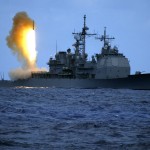A closer look a the FY16 National Defense Authorization Act.
The Pentagon’s Quantity Over Quality Problem
The United States spent just about $610 billion on defense last year. That’s more than the next seven countries combined.
But it’s not new news that the U.S. spends more than any other country on defense. What is becoming more apparent, as we come to the end of the 2015 fiscal year, is the opaque and often inconsistent method by which Congress splices together the Pentagon budget.
Millennials Tackle Nuclear Security
Six years ago, President Obama stood in Hradcany Square in Prague, Czech Republic and announced “America’s commitment to seek the peace and security of a world without nuclear weapons.” The President outlined a broad and bold strategy that focused on stopping rogue nuclear states, securing nuclear materials, and lowering weapon stockpiles.
Diplomacy Wins: US-Cuban Relations
On July 20, a flag raising ceremony drew hundreds of spectators and marked the reopening of the Cuban embassy in the United States. The short ceremony paled in comparison to the monumental shift in US foreign policy that the embassy opening represents. After years of estrangement, Cuba and the United States officially normalized diplomatic relations, ending a generation long stand-off.
Why ISIS Cannot Be Defeated by Putting US Boots on the Ground
Seemingly overnight, the terrorist organization ISIS established an illegitimate state spanning the borders of Iraq and Syria. Systematic human rights abuses and dramatic executions have drawn the world’s attention to the group; however, ISIS does not pose an immediate existential threat to the United States, begging the question: are there options other than putting US put boots on the ground to combat this problem?

